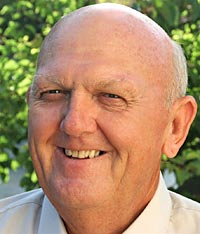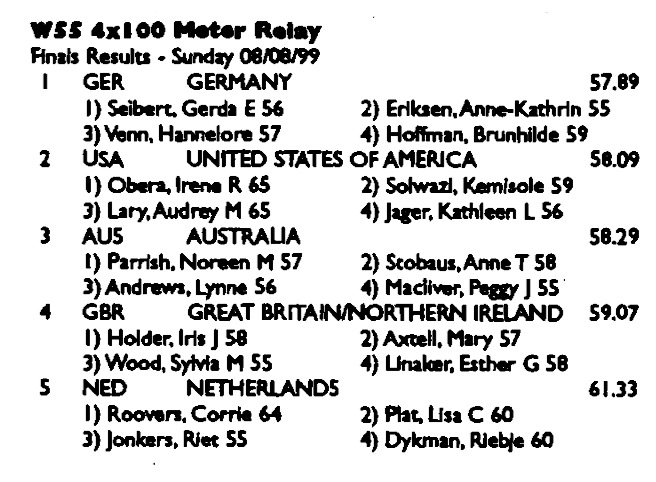
Stan Perkins
, WMA president, has changed his mind. Or maybe IAAF
Rule 39.2 did it. In reply to a query, Stan wrote me today: “All medals awarded to
Val Barnwell as well as his relay team members will be requested to be returned. In addition, the change of placings in the events he contested will be done and new medals awarded as appropriate. The affiliate of the athletes concerned will be requested to assist in this process.” Rule 39.2 regards “Disqualification of Results.” It states: “Where the athlete who commits an anti-doping rule violation under Rule 39.1 is a member of a relay team, the relay team shall be automatically disqualified from the event in question, with all resulting consequences for the relay team, including the forfeiture of all titles, awards, medals, points and prize and appearance money.” This may be a masters first. After
1999 Gateshead worlds,
Kathy Jager was stripped of her medals amid a drug suspension, but I have no memory of her 4×100 relay mates being asked to return their W55 silver medals.

Did Australia and Britain end up with silver and bronze that year?
WMA Rules of Competition have no explicit policy on the return of relay medals, but it has Rule 7.1:
WMA World Championships, Regional Masters Athletics Championships, Inter-Regional Masters competition and National Masters Athletics Championships shall be conducted in accordance with the technical rules of IAAF except as modified by the WMA Constitution, Bye-Laws and/or Rules of Competition. The IAAF rule changes shall require endorsement by the WMA Council before introduction into WMA competitions.
So I guess Stan was stuck. Someone may have pointed out the IAAF rule and he said, “Oops.”
But I doubt USATF will spend a lot of time and energy collecting medals from Val’s relay teammates.
Stay tuned.








7 Responses
Take their medals away and nobody will run with him again. That’s why they call it deterrence.
Ken look out for that Pesky Perkins’ Precedent.
Let’s say during a relay, the first two runners follow the rules but the third guy says, “I’ve paid my own way here; I don’t have to pass this baton.” So he just slaps the hand of the anchor who continues running. Since they finished first, they argue they shouldn’t be penalized just because one of the guys didn’t pass the baton. I mean, the other three played by the rules. But of course, they lost the argument and couldn’t keep their medals.
Yet under the Perkins’ Precedent, another team got to keep their medals when one runner passed the baton but not the drug test, (although he did get suspended for 2 years.) So obviously not passing the baton’s a more serious violation than not passing a drug test. Therefore, ya make a bad pass, should you be suspended for 3 years?
You’re lucky Ken, ya didn’t drop that baton at Lahti.
Audrey Lary writes regarding 1999 relay medals:
“No, I was never asked to return my medal, and I think I’ll plead senility if asked.”
So either Rule 39.2 didn’t exist at that time, or the WAVA Council led by President Torsten Carlius didn’t follow “the rules” by confiscating medals.
Also, Gary Snyder tells me that Stan’s change of mind was never telegraphed to him.
Gary, our national chairman, wrote me:
“WMA has never contacted me regarding anything connected to the suspension.”
Maybe at Kamloops, when Gary refused Stan Perkins invitation to deal with Barnwell, Stan just thought Gary wasn’t intersted. And what input, if any, did Gary as a National Chair, give WMA about our relay team, the medals or the doping violation?
Certainly when Gary first found out about this there, he didn’t come out right away and speak on behalf of USATF Masters or as a concerned competitor or let us know where he stands. It may not be a fair interpretation, but some might misconstrue his silence up until now, over a couple of the more significant events in USATF Masters, as lack of leadership or interest.
I like Gary personally but can’t say I’m impressed by his responses.
Gary’s response to this situation called for a thoughtful, measured response. Those of you expecting some shoot from the hip response will be disappointed. I, for one, prefer the level headed approach from our leaders. This is new territory for us masters and our leaders should tread carefully.
Mike T.
Oops, I was quoting the wrong IAAF rule book — from 2008.
The current rule (in 2010-2010 Rules of Competition) is Rule 41.1:
http://www.iaaf.org/mm/Document/AboutIAAF/Publications/05/47/80/20091027085725_httppostedfile_CompRules-BAT_17164.pdf
Rule 41.1 says:
Where the Athlete who has committed an anti-doping rule violation competed as a member of a relay team, the relay team shall be automatically disqualified from the Event in question, with all resulting consequences for the relay team, including the forfeiture of all titles, awards, medals, points and prize money. If the Athlete who has committed an anti-doping rule violation competes for a relay team in a subsequent Event in the Competition, the relay team shall be disqualified from the subsequent Event, with all the same resulting consequences for the relay team, including the forfeiture of all titles, awards, medals, points and prize money unless the Athlete establishes that he bears No Fault or Negligence for the violation and that his participation in the relay was not likely to have been affected by the anti-doping rule violation.
An expert on the Track & Field News message board posted this info:
The language explicitly requiring the DQ of relay teams when one member is found to have been doping was added by the IAAF effective January 1, 2004.
Leave a Reply